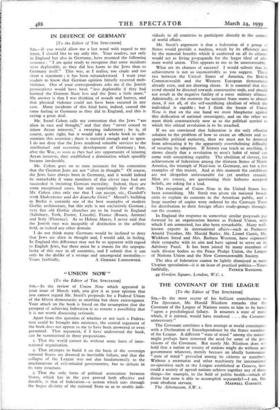"UNION NOW"
[To the Editor of THE SPECTATOR] SIR,—In the review of Union Now which appeared in your issue of March loth, you give it as your opinion that you cannot regard Mr. Streit's proposals for a Federal Union of the fifteen democracies as anything but sheer extravaganza. Your attack on the book is based on the assumption that the prospect of achieving federation is so remote a possibility that it is not worth discussing seriously.
Apart from this question of whether or not such a Federa- tion could be brought into existence, the central argument of the book does not appear to me to have been answered or even presented. That argument, if I have understood the book, can be summarised in three propositions.
1. That the world cannot do without some form of inter- national organisation.
2. That attempts to build it on the basis of the sovereign national States are doomed to inevitable failure, and that the collapse of the League was not due fundamentally to the machinations of evil-minded governments, but to defects in its very structure.
3. That the only form of political association between States, which has in the past proved both effective and durable, is that of federation—a system which cuts through the bogus divinity, of the national State so as to enable indi-
viduals in all countries to participate directly in the control of world affairs.
Mr. Streit's argument is that a federation of a group of States would provide a nucleus, winch by its efficiency, .and
by the material benefits which it conferred on all its citizens would act as living propaganda for the larger ideal of ulti- mate world union. This appears to me to be unanswerable.
What are its chances of success? I would submit that its achievement is not so inconceivable as you suggest. These
ties between the United States of America, the British Commonwealth and the Western European democracies already exist, and are drawing closer. It is essential that this trend should be directed towards constructive ends, and should not result in the negative futility of a mere military alliance. Admittedly, at the moment the national State seems to absorb most, if not all, of the self-sacrificing idealism of which the
individual is capable ; but I think the lesson of Union Now is that on the one hand we must blaspheme against
this deification of national sovereignty, and on the other we must think constructively now as to the political symbol to which this ethical revolution is to be attached.
If we are convinced that federation is the only effective solution to the problem of how to create an efficient and re- sponsible political authority, then we must not be deterred from advocating it by the apparently overwhelming difficulty of securing its adoption. If history can teach us anything, it shows clearly that a revolution in men's habit of mind can come with astonishing rapidity. The abolition of slavery, the achievement of federation among the thirteen States of North America, the triumph of Nazi-ism in Germany, are but a few examples of this truism. And at this moment the conditions are not altogether unfavourable for yet another crusade. Men are uneasy, are questioning their hitherto accepted beliefs, are asking for a lead.
The reception of Union Now in the United States has been astonishing. Mr. Streit was given six national broad- casts to explain its contents to the American public, and a large number of copies were ordered by the Carnegie Trust for distribution to their foreign affairs study-groups through- out the country.
In England the response to somewhat similar proposals put forward by an organisation known as Federal Union, with
which I am connected, has also been remarkable. Many well- known experts in international affairs—such as Professor Arnold Toynbee, Mr. Harold Butler, Mr. Lionel Curtis, Mr.
Wickham Steed and Mrs. Barbara Wootton, have expressed their sympathy with its aim and have agreed to serve on its Advisory Panel. It has been joined by many members of such diverse bodies as the Peace Pledge Union, the League of Nations Union and the New Commonwealth Society.
The idea of federation cannot be lightly dismissed as mere Utopian speculation—it is an issue of practical politics.—Yours














































 Previous page
Previous page